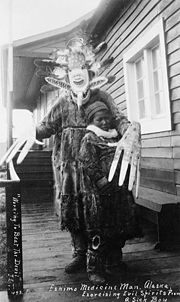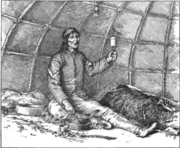
Medicine man
Encyclopedia

English language
English is a West Germanic language that arose in the Anglo-Saxon kingdoms of England and spread into what was to become south-east Scotland under the influence of the Anglian medieval kingdom of Northumbria...
terms used to describe traditional healers and spiritual leaders among Native American
Indigenous peoples of the Americas
The indigenous peoples of the Americas are the pre-Columbian inhabitants of North and South America, their descendants and other ethnic groups who are identified with those peoples. Indigenous peoples are known in Canada as Aboriginal peoples, and in the United States as Native Americans...
and other indigenous or aboriginal peoples. Anthropologists tend to prefer the term "shaman
Shamanism
Shamanism is an anthropological term referencing a range of beliefs and practices regarding communication with the spiritual world. To quote Eliade: "A first definition of this complex phenomenon, and perhaps the least hazardous, will be: shamanism = technique of ecstasy." Shamanism encompasses the...
," a specific term for a spiritual mediator from the Tungusic peoples
Tungusic peoples
Tungusic peoples are the peoples who speak Tungusic languages. The word originated in Tunguska, an ill-defined region of Siberia.-Peoples:Tungusic peoples are:*Evenks*Evens*Jurchens *Manchu*Negidals...
of Siberia
Siberia
Siberia is an extensive region constituting almost all of Northern Asia. Comprising the central and eastern portion of the Russian Federation, it was part of the Soviet Union from its beginning, as its predecessor states, the Tsardom of Russia and the Russian Empire, conquered it during the 16th...
.
Role in native society
The primary function of these "medicine elders" (who are not always maleMale
Male refers to the biological sex of an organism, or part of an organism, which produces small mobile gametes, called spermatozoa. Each spermatozoon can fuse with a larger female gamete or ovum, in the process of fertilization...
) is to secure the help of the spirit world, including the Great Spirit
Great Spirit
The Great Spirit, also called Wakan Tanka among the Sioux, the Creator or the Great Maker in English, and Gitchi Manitou in Algonquian, is a conception of a supreme being prevalent among some Native American and First Nations cultures...
(Wakan Tanka
Wakan Tanka
In the Sioux way of life, Wakan Tanka is the term for "the sacred" or "the divine". This is usually translated as "The Great Spirit"...
in the language of the Lakota
Lakota language
Lakota is a Siouan language spoken by the Lakota people of the Sioux tribes. While generally taught and considered by speakers as a separate language, Lakota is mutually understandable with the other two languages , and is considered by most linguists one of the three major varieties of the Sioux...
Sioux
Sioux
The Sioux are Native American and First Nations people in North America. The term can refer to any ethnic group within the Great Sioux Nation or any of the nation's many language dialects...
), for the benefit of the entire community.
Sometimes the help sought may be for the sake of healing
Healing
Physiological healing is the restoration of damaged living tissue, organs and biological system to normal function. It is the process by which the cells in the body regenerate and repair to reduce the size of a damaged or necrotic area....
disease
Disease
A disease is an abnormal condition affecting the body of an organism. It is often construed to be a medical condition associated with specific symptoms and signs. It may be caused by external factors, such as infectious disease, or it may be caused by internal dysfunctions, such as autoimmune...
, sometimes it may be for the sake of healing the psyche
Psyche (psychology)
The word psyche has a long history of use in psychology and philosophy, dating back to ancient times, and has been one of the fundamental concepts for understanding human nature from a scientific point of view. The English word soul is sometimes used synonymously, especially in older...
, sometimes the goal is to promote harmony between human groups or between humans & nature. So the term "medicine man/woman" is not entirely inappropriate, but it greatly oversimplifies and also skews the depiction of the people whose role in society complements that of the chief. These people are not the Native American equivalent of the Chinese "barefoot doctors", herbalists, nor of the emergency medical technicians who ride rescue vehicles.
To be recognized as the one who performs this function of bridging between the natural world and the spiritual world for the benefit of the community, an individual must be validated in his role by that community. Medicine men and women study through a medicine society or from a single teacher.
Cultural context

Cherokee
The Cherokee are a Native American people historically settled in the Southeastern United States . Linguistically, they are part of the Iroquoian language family...
) of the National Museum of the American Indian
National Museum of the American Indian
The National Museum of the American Indian is a museum operated under the auspices of the Smithsonian Institution that is dedicated to the life, languages, literature, history, and arts of the native Americans of the Western Hemisphere...
writes, "The knowledge possessed by medicine people is privileged, and it often remains in particular families."
Native Americans tend to be quite reluctant to discuss issues about medicine or medicine people with non-Indians. In some cultures, the people will not even discuss these matters with Indians from other tribes. In most tribes medicine elders are not expected to advertise or introduce themselves as such. As Nuttall writes, "An inquiry to a Native person about religious beliefs or ceremonies is often viewed with suspicion. One example of this was the Apache medicine cord or Izze-kloth
Izze-kloth
The Izze-kloth or Medicine cord is a sacred cord worn by Apache medicine men that is believed to confer strength and special powers of healing to the wearer. The izze-kloth is usually made from strands of animal hide and its length punctuated with beads and shells...
, whose purpose and use by Apache
Apache
Apache is the collective term for several culturally related groups of Native Americans in the United States originally from the Southwest United States. These indigenous peoples of North America speak a Southern Athabaskan language, which is related linguistically to the languages of Athabaskan...
medicine elders was a mystery to nineteenth century ethnologists because "the Apache look upon these cords as so sacred that strangers are not allowed to see them, much less handle them or talk about them."
The 1954 version of Webster's New World Dictionary of the American Language, reflects the poorly grounded perceptions of the people whose use of the term effectively defined it for the people of that time: "a man supposed to have supernatural powers of curing disease and controlling spirits." In effect, such definitions were not explanations of what these "medicine people" were to their own communities, but instead reported on the consensus of socially and psychologically remote observers when they tried to categorize these individuals. The term "medicine man/woman," like the term "shaman"
Shamanism
Shamanism is an anthropological term referencing a range of beliefs and practices regarding communication with the spiritual world. To quote Eliade: "A first definition of this complex phenomenon, and perhaps the least hazardous, will be: shamanism = technique of ecstasy." Shamanism encompasses the...
, has been criticized by Native Americans, as well as other specialists in the fields of religion and anthropology.
The term "medicine man/woman" was also frequently used by Europeans to refer to Africa
Africa
Africa is the world's second largest and second most populous continent, after Asia. At about 30.2 million km² including adjacent islands, it covers 6% of the Earth's total surface area and 20.4% of the total land area...
n traditional healers, also known as "witch doctor
Witch doctor
A witch doctor originally referred to a type of healer who treated ailments believed to be caused by witchcraft. It is currently used to refer to healers in some third world regions, who use traditional healing rather than contemporary medicine...
s" or "fetish
Fetishism
A fetish is an object believed to have supernatural powers, or in particular, a man-made object that has power over others...
men/women".
See also
- CuranderoCuranderoA curandero or curandeiro is a traditional folk healer or shaman in Latin America, who is dedicated to curing physical or spiritual illnesses. The role of a curandero or curandera can also incorporate the roles of psychiatrist along with that of doctor and healer. Many curanderos use Catholic...
- EthnobotanyEthnobotanyEthnobotany is the scientific study of the relationships that exist between people and plants....
- HerbalismHerbalismHerbalism is a traditional medicinal or folk medicine practice based on the use of plants and plant extracts. Herbalism is also known as botanical medicine, medical herbalism, herbal medicine, herbology, herblore, and phytotherapy...
- Keewaydinoquay PeschelKeewaydinoquay PeschelKeewaydinoquay Pakawakuk Peschel was a scholar, ethnobotanist, herbalist, medicine woman, teacher and author. She was an Anishinaabeg Elder of the Crane Clan...
- Kallawaya
- MidewiwinMidewiwinThe Midewiwin or the Grand Medicine Society is a secretive religion of the aboriginal groups of the Maritimes, New England and Great Lakes regions in North America. Its practitioners are called Midew and the practices of Midewiwin referred to as Mide...
- Plastic shamanPlastic shamanPlastic shaman is a pejorative colloquialism applied to individuals who are attempting to pass themselves off as shamans, holy people, or other traditional spiritual leaders, but who have no genuine connection to the traditions or cultures they claim to represent...
- Prehistoric medicinePrehistoric medicinePrehistoric medicine is a term used to describe the use of medicine before the invention of writing. As the timing of the invention of writing varies per culture and region, the term "prehistoric medicine" encompasses a wide range of time periods and dates....
- ShamanismShamanismShamanism is an anthropological term referencing a range of beliefs and practices regarding communication with the spiritual world. To quote Eliade: "A first definition of this complex phenomenon, and perhaps the least hazardous, will be: shamanism = technique of ecstasy." Shamanism encompasses the...
- TranceTranceTrance denotes a variety of processes, ecstasy, techniques, modalities and states of mind, awareness and consciousness. Trance states may occur involuntarily and unbidden.The term trance may be associated with meditation, magic, flow, and prayer...
- KennekukKennekukKennekuk , also known as the "Kickapoo Prophet", was a Kickapoo medicine man and spiritual leader of the Vermilion band of the Kickapoo nation. He lived in East Central Illinois much of his life along the Vermilion River and led a community of followers, whose beliefs centered on non-violence,...

